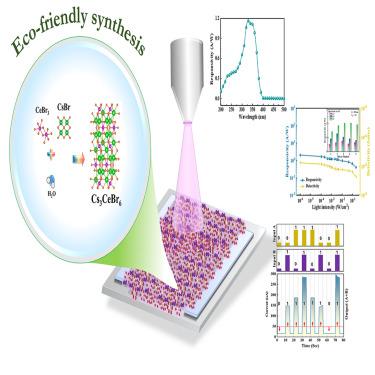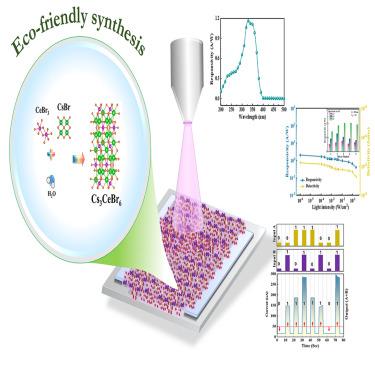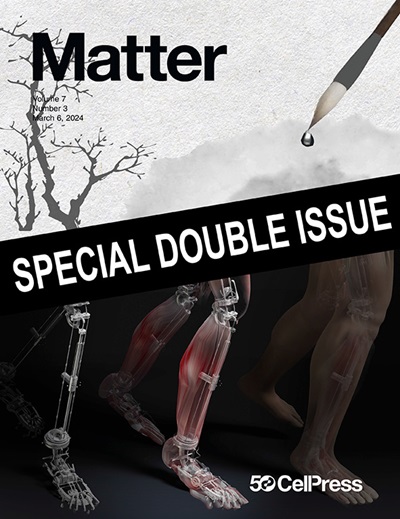铈基卤化物包晶衍生物:无铅窄带紫外光检测的理想替代品
IF 17.3
1区 材料科学
Q1 MATERIALS SCIENCE, MULTIDISCIPLINARY
引用次数: 0
摘要
金属卤化物过氧化物在光电应用中大有可为,但也面临着铅毒性、稳定性差和光致发光量子产率(PLQY)低等挑战。Cs3CeBr6 是一种无毒稀土材料,是一种潜在的无铅替代品。由于 Cs3CeBr6 的合成传统上需要高温,本研究提出了一种低温、环保且经济高效的方法。该材料具有较窄的紫外激发范围(280-370 nm),能发出紫光,PLQY 为 89%,光致发光(PL)衰减时间为 28.3 ns。利用这些特性,我们开发出了一种高效的光谱选择性可见光盲紫外光光电探测器,在低偏置电压(1 V)下表现出卓越的响应度(2.05 A/W)和高检测度(1013 Jones)。该器件具有长期稳定性和能效。这项研究探索了薄膜中的载流子传输和缺陷动力学,从而提高了紫外响应性,标志着低功耗器件技术取得了重大进展。本文章由计算机程序翻译,如有差异,请以英文原文为准。


Cerium-based halide perovskite derivatives: A promising alternative for lead-free narrowband UV photodetection
Metal halide perovskites are promising for optoelectronic applications but face challenges like lead toxicity, poor stability, and low photoluminescence quantum yield (PLQY). Cs3CeBr6, a non-toxic rare-earth material, is a potential lead-free alternative. As the synthesis of Cs3CeBr6 traditionally requires high temperatures, this study presents a low-temperature, eco-friendly, and cost-effective method for its formation. The material exhibits a narrow UV excitation range (280–370 nm) and emits violet light with an impressive PLQY of ∼89% and a photoluminescence (PL) decay time of 28.3 ns. Utilizing these properties, an efficient spectrum-selective visible-blind UV photodetector was developed, demonstrating exceptional responsivity (2.05 A/W) and high detectivity (1013 Jones) at low bias voltage (1 V). The device shows long-term stability and energy efficiency. This study explores carrier transport and defect dynamics in thin films to enhance UV responsiveness, marking a significant advancement in low-power-consumption device technology.
求助全文
通过发布文献求助,成功后即可免费获取论文全文。
去求助
来源期刊

Matter
MATERIALS SCIENCE, MULTIDISCIPLINARY-
CiteScore
26.30
自引率
2.60%
发文量
367
期刊介绍:
Matter, a monthly journal affiliated with Cell, spans the broad field of materials science from nano to macro levels,covering fundamentals to applications. Embracing groundbreaking technologies,it includes full-length research articles,reviews, perspectives,previews, opinions, personnel stories, and general editorial content.
Matter aims to be the primary resource for researchers in academia and industry, inspiring the next generation of materials scientists.
 求助内容:
求助内容: 应助结果提醒方式:
应助结果提醒方式:


